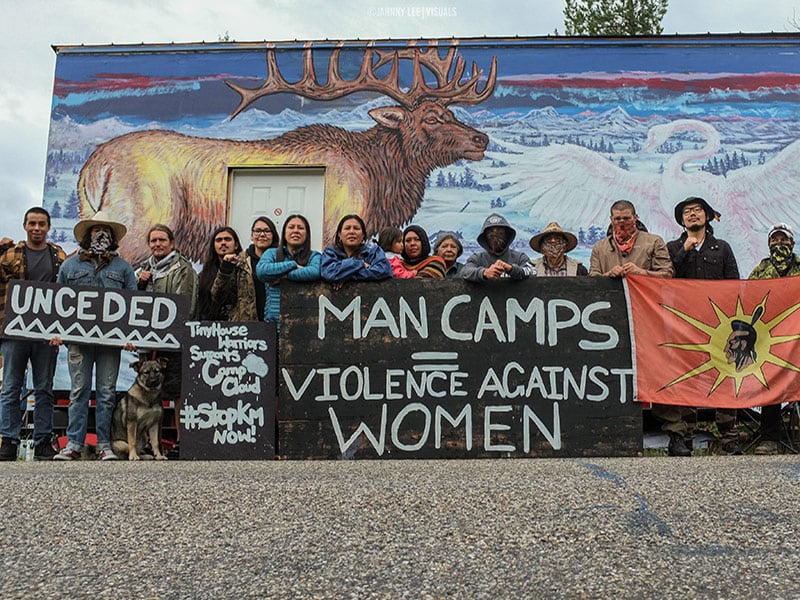The Canadian government says it will respond next year to criticism from the United Nations over its handling of Indigenous rights and large industrial projects, despite the deadline for response passing earlier this week.
A year ago, the UN Committee on the Elimination of Racial Discrimination called on Canada to immediately stop resource projects opposed by Indigenous communities.
It specifically named the Site C dam, Trans Mountain pipeline and Coastal GasLink pipeline as projects that had not received free, prior and informed consent of First Nations, and it asked Canada to develop “a legal and institutional framework to ensure adequate consultation.”
It also called on the federal government to stop the forced evictions against Secwe̓pemc and Wet’suwet’en peoples, nations that have opposed pipeline construction through their traditional territories with land occupations.
The deadline to respond to the letter, which was sent Nov. 24, 2020, was Monday.
The committee initially issued a warning in December 2019 before following up with last year’s letter to Leslie Norton, Canada’s permanent representative to the United Nations in Geneva.
A response sent by Canada on July 7, 2020 has not been made public. But in its Nov. 24, 2020 followup letter, the UN committee expressed disappointment in the response, saying Canada had “provided no information on measures taken to address the concerns raised by the Committee in its decision of 13 December 2019.”
“The Committee regrets the State party interprets the free, prior and informed consent principle as well as the duty to consult as a duty to engage in a meaningful and good faith dialogue with indigenous peoples and to guarantee a process, but not a particular result,” the letter reads.
It gave the federal government until Nov. 15 to respond with updated information on measures taken to address the issues.
In an emailed statement, a spokesperson for Canadian Heritage, Daniel Savoie, said various federal departments, as well as provincial and territorial governments, are working on Canada’s next periodic reports to the International Convention on the Elimination of All Forms of Racial Discrimination.
Savoie said the pandemic had slowed the collaborative process.
“As a result, Canada is currently aiming to submit its combined reports to the United Nations in 2022. The report will be released publicly when it is submitted to the UN,” Savoie said, adding that Canada is committed to the ICERD, which was adopted by the UN General Assembly in 1965 and ratified by Canada five years later.
Canada is required to report to the committee every two years or when further information is requested.
Kanahus Manuel, whose people are Secwe̓pemc and Ktunaxa, is a member of the Tiny House Warriors who have been occupying a camp on Secwe̓pemc territory near the Trans Mountain Pipeline route for several years.
She said the federal government needs to stop ignoring its commitment to Indigenous rights.
“Our main focus was always to assert our title and rights to the land,” she said. “We have rights. We have our Indigenous rights, our Secwe̓pemc rights. We have internationally respected human rights. And we even have Canadian constitutional rights, for our title and rights, and yet we continue to just be ignored.”
Last week, the Tiny House Warriors received the Carole Geller Human Rights Award, the seventh time the award has been given since 1993. It was last presented to Idle No More founders in 2013.
Named for feminist and human rights activist Carole Geller, who died in 1987, the award is meant to assist in organizing for social justice and human rights and comes with a $15,000 prize.
Manuel said the money will go toward the group’s legal fees and preparing the camp as the group heads into its fourth winter on the territory.
“It takes a lot of resources to be a frontline land defender, especially just transportation-wise and food-wise and being able to supply a camp,” she said.
Kathleen Ruff, a prominent Canadian human rights advocate and award committee member, said the Tiny House Warriors were an obvious choice.
“The Tiny House Warriors are following in the best tradition of human rights leaders. They’re following in the tradition of Gandhi and Martin Luther King. They’re putting their bodies on the line and they’re facing great hostility because of that,” Ruff said.
“To my mind, there’s something deeply wrong and disturbing when organizations like the UN Human Rights Committee and Amnesty International get disregarded and treated as insignificant by our government.”
With COP26 wrapping up last week and Canada supporting declarations that put Indigenous leadership front and centre in the response to climate change, in addition to a commitment to transition away from fossil fuels, Canada needs to acknowledge its commitment to Indigenous rights, Ruff said.
“It should be a top priority. This is an international, binding law. Canada has ratified and signed it, and we’re supposed to take it seriously. If Canada doesn’t take it seriously, we’re in very deep trouble,” she said.
The Tyee reached out to Norton, Canada’s representative to the UN. In an emailed response, the Permanent Mission of Canada to the UN in Geneva said, “We are currently determining Government of Canada position on this matter and do not have any public information to share at this time.”
Global Affairs Canada, which manages diplomatic relations, directed The Tyee’s questions to Heritage Canada.
The department, which represents arts and culture, said its mandate also includes “the promotion of a greater understanding of human rights, fundamental freedoms and related values,” giving it a responsibility for Canada’s international human rights reporting.
“Canadian Heritage does this work in close collaboration with the Department of Justice and Global Affairs Canada,” Savoie said.
Prime Minister Justin Trudeau’s office also directed questions to Heritage Canada.
Canada has been under increasing pressure to bring its policies into alignment with the UN Declaration on the Rights of Indigenous Peoples, which it passed into law in June.
B.C. passed similar legislation two years ago.
In August, dozens of human rights groups and prominent Canadians, including Amnesty International Canada, David Suzuki and Naomi Klein, signed an open letter to Trudeau and RCMP commissioner Jennifer Strachan that criticized the treatment of Tiny House Warriors by the federal government, RCMP and Trans Mountain Corp.
It also flagged the lack of response to the UN.
“To date, Canada has provided no information on measures taken to address the concerns raised by the UN Committee,” the letter reads.
“We urge you to heed the decision of the UN Committee for the Elimination of Racial Discrimination and immediately suspend permits and halt construction until the Secwepemc people give their free, prior and informed consent to the pipeline expansion, and to remove associated security and surveillance technologies from Secwepemc lands.”
Wet’suwet’en Hereditary Chief Na’Moks, whose English name is John Ridsdale, was in the B.C. legislature the day the Declaration on the Rights of Indigenous Peoples Act passed in October 2019.
He said passing the UN declaration into law while continuing to force industrial projects on First Nations amounts to words without action.
“We know industry is pulling the strings,” Na’Moks said. “This is why our people are doing what we do. Because obviously, provincially and federally, they just say words and meanwhile they send in the armed forces against us, call us criminals.”
On Monday, the B.C. government issued a statement about ongoing conflicts on the Morice West Forest Service Road south of Houston, where Wet’suwet’en land defenders have been blocking access to Coastal GasLink worksites over the past two months.
The release reiterated the province’s claims that it has adequately consultated with the Wet’suwet’en.
“For many years, the Province has attempted to facilitate discussions between Wet'suwet'en Hereditary Chiefs and representatives of Coastal GasLink project,” the statement from Public Safety Minister Mike Farnworth said.
“Open, transparent and timely communication with First Nations, including the Wet’suwet’en Hereditary Chiefs, has been the guiding principle of government. It remains the only way forward.”
But Wet’suwet’en hereditary leaders have for years maintained their opposition to the project.
“A minister calling us criminals, when we’re actually saying, ‘We need to protect our waters, our salmon, our land, our air, our rights and title, our very freedom, and we need to be treated as humans' — they’re not doing that,” Na’Moks said.
Canadian Heritage said it will “liaise directly with the Government of British Columbia to obtain the most recent available information” for its report to the UN.
Manuel said acknowledgements like the UN support and recent award signify strides in global recognition that Indigenous rights are human rights.
“Before, when Indigenous people would stand up and have a blockade, people never labelled us as human rights defenders,” she said. “But now when people see Indigenous rights as actual human rights, I think that’s a real success and a real win for us, as freedom fighters, land defenders, human rights defenders.” ![]()
Read more: Indigenous, Rights + Justice
















Tyee Commenting Guidelines
Comments that violate guidelines risk being deleted, and violations may result in a temporary or permanent user ban. Maintain the spirit of good conversation to stay in the discussion.
*Please note The Tyee is not a forum for spreading misinformation about COVID-19, denying its existence or minimizing its risk to public health.
Do:
Do not: